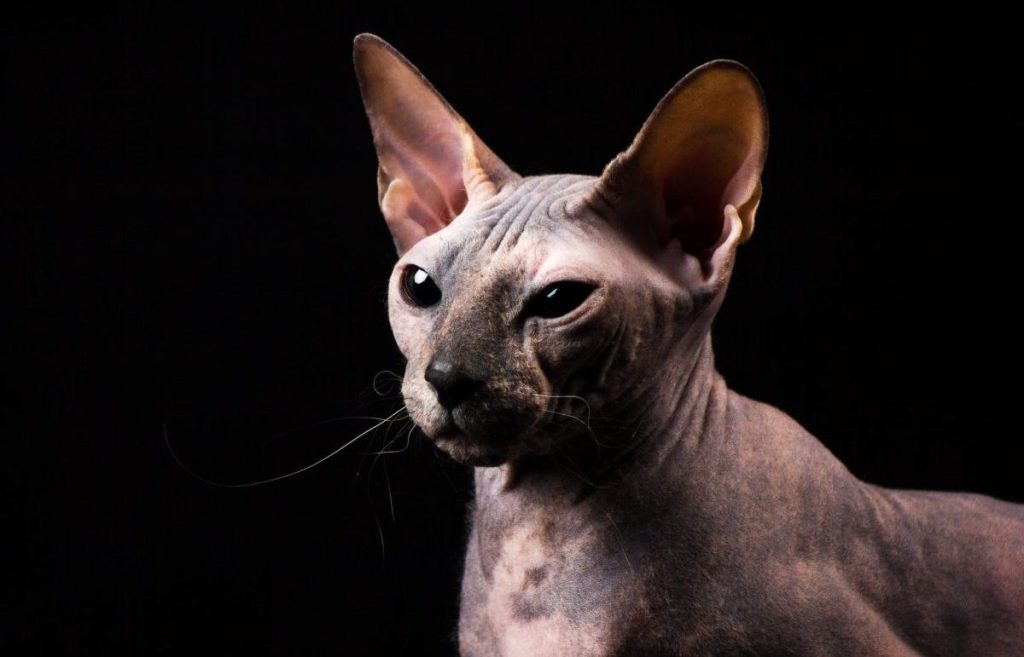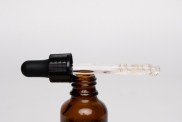You might think the Donskoy is a Sphynx cat with a Russian accent, but you’d be wrong. While they are both hairless cat breeds that sometimes resemble an uncooked chicken, the Donskoy’s hairlessness is a result of a genetic mutation that is passed down through a dominant gene. The Sphynx’s, rather, is a result of a recessive gene, so they are not related. Emerging in Rostov-on-Don, Russia in the 1980s, Donskoys are warm and soft to the touch, making them a unique and affectionate feline companion.
What is the personality of a Donskoy cat?
Also known as Don Sphynx cats or Russian Hairless, Donskoy cats are known for being friendly and sociable. They often seek warmth and closeness, probably due to having no hair and living in Russia. They’re playful and interactive, almost like having an attention-seeking elf-like animal in your home. There are four types of Donskoy cats: rubber bald, flocked, velour, and brush, all differentiated by the amount of hair they possess. You may also wonder if the Don Sphynx is unethical to own or breed, but if they are well-cared for and loved, there shouldn’t be an issue. Their lack of fur does require some accommodations, but a well-versed owner should have no problems. Surprisingly not rare outside of Russia, the Donskoy makes a great addition to any household looking for an affectionate, playful cat that also serves as a conversation-starter.
When considering a Donskoy, it’s advisable to prioritize adopting from rescue organizations or shelters to provide a loving home to a cat in need. However, if you decide to purchase, it’s crucial to choose a reputable breeder. Conduct thorough research to ensure that the breeder follows ethical practices and prioritizes the well-being of their cats. Reputable Donskoy breeders prioritize the health and temperament of their cats, conduct necessary health screenings, and provide a nurturing environment for the kitties. This active approach ensures that you bring home a healthy and happy kitty while discouraging unethical breeding practices.
Quick Facts
- Origin: Russia
- Size: Medium
- Breed Group: Hairless/Semi-hairless (Don Sphynx or Donskoy)
- Lifespan: 12-15 years
- Coat: Can be hairless, flocked (appears hairless but feels like chamois), velour (short, fine hair), brush (sparse, curly hair), or straight (short, fine hair).
- Temperament: Intelligent, playful, affectionate, loyal, social, active, curious, enjoys human interaction
- Exercise Needs: Moderate to high
- Training: Easy to train, enjoys learning tricks
- Grooming: Varies depending on coat type, but generally requires regular bathing and moisturizing.
- Health: Generally healthy, but some potential for genetic health conditions, such as hypertrophic cardiomyopathy (HCM).
- The hairlessness gene in Donskoy cats is dominant unlike other Sphynx breeds. These cats are either born bald or lose their fur over time.
- Aside from lacking fur, Donskoys also lack whiskers!
- There are four types of Donskoys: Rubber Bald, Flocked, Velour, and Brush. The Brush and Velour coats may retain some fur as they grow.
Donskoy Pictures
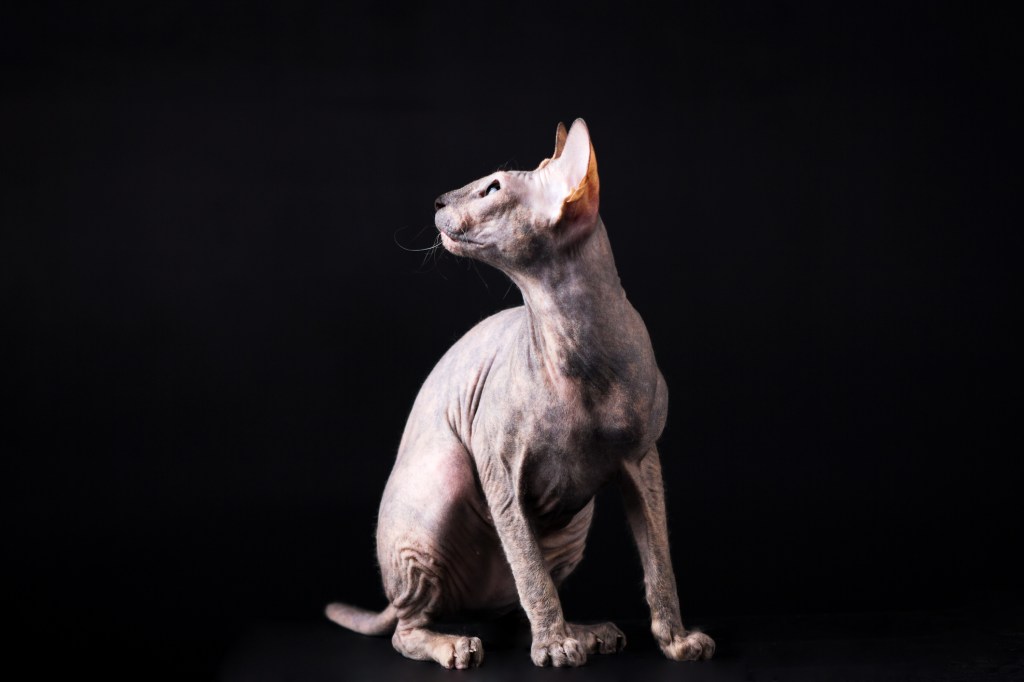
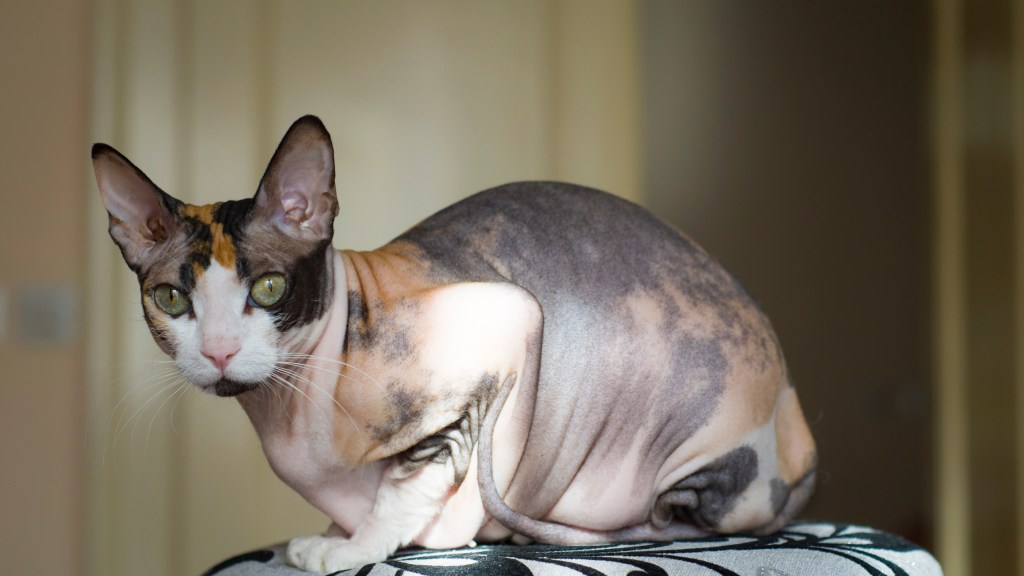
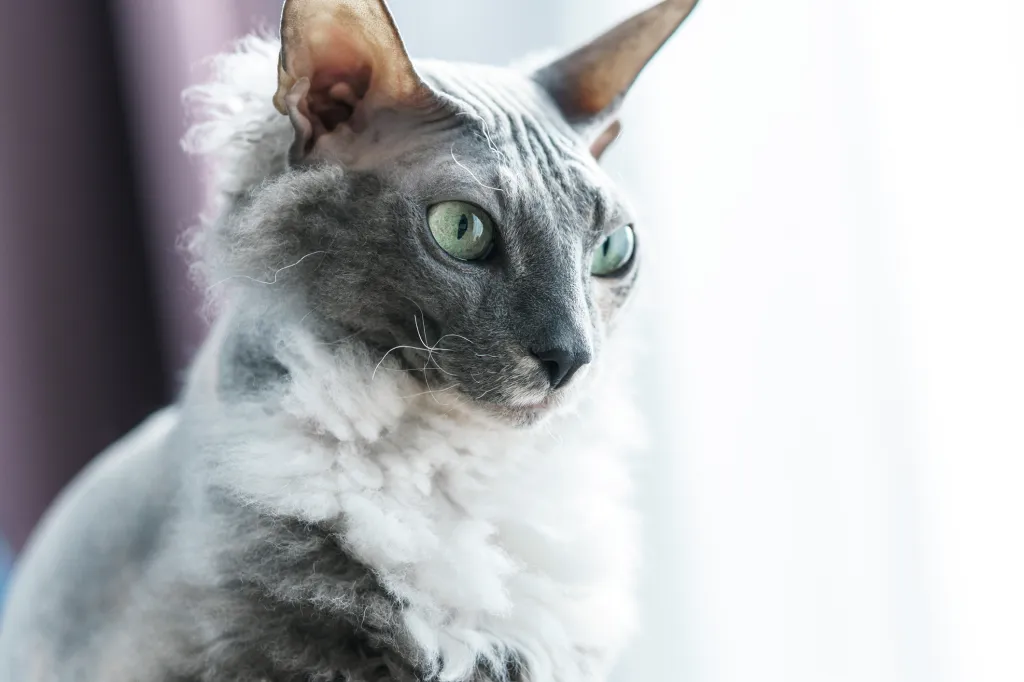
-
Affectionate with Family
Some cat breeds are typically independent and aloof, even if they’ve been raised by the same person since kittenhood; others bond closely to one person and are indifferent to everyone else; and some shower the whole family with affection. Breed isn’t the only factor that goes into affection levels; cats who were raised inside a home with people around feel more comfortable with humans and bond more easily.

See Cats Less Affectionate with Family -
Amount of Shedding
If you’re going to share your home with a cat, you’ll need to deal with some level of cat hair on your clothes and in your house. However, shedding does vary among the breeds. If you’re a neatnik, you’ll need to either pick a low-shedding breed or relax your standards. This furniture cover can make it easier to clean up cat hair and keep it off your sofa!
-
General Health
Due to poor breeding practices, some breeds are prone to certain genetic health problems. This doesn’t mean that every cat of that breed will develop those diseases; it just means that they’re at an increased risk. If you’re looking only for purebred cats or kittens, it’s a good idea to find out which genetic illnesses are common to the breed you’re interested in.
-
Potential for Playfulness
Some cats are perpetual kittens—full of energy and mischief—while others are more serious and sedate. Although a playful kitten sounds endearing, consider how many games of chase the mouse-toy you want to play each day, and whether you have kids or other animals who can stand in as playmates. A classic wand cat toy like this one is perfect for playful felines!
-
Tendency to Vocalize
Some breeds sound off more often than others with meows, yowls, and chattering. When choosing a breed, think about how the cat vocalizes and how often. If constant “conversation” drives you crazy, consider a kitty less likely to chat.
-
Kid-Friendly
Being tolerant of children, sturdy enough to handle the heavy-handed pets and hugs they can dish out, and having a nonchalant attitude toward running, screaming youngsters are all traits that make a kid-friendly cat. Our ratings are generalizations, and they’re not a guarantee of how any breed or individual cat will behave; cats from any breed can be good with children based on their past experiences and personality.
-
Friendly Toward Strangers
Stranger-friendly cats will greet guests with a curious glance or a playful approach; others are shy or indifferent, perhaps even hiding under furniture or skedaddling to another room. However, no matter what the breed, a cat who was exposed to lots of different types, ages, sizes, and shapes of people as a kitten will respond better to strangers as an adult.
-
Easy to Groom
Some breeds require very little in the way of grooming; others require regular brushing to stay clean and healthy. Consider whether you have the time and patience for a cat who needs daily brushing. You should definitely pick up this awesome de-shedding tool for cats of any hair length!
-
Intelligence
Some cat breeds are reputed to be smarter than others. But all cats, if deprived the mental stimulation they need, will make their own busy work. Interactive cat toys are a good way to give a cat a brain workout and keep them out of mischief. This scratcher cat toy can keep your smart kitty busy even when you’re not home!
-
Pet Friendly
Friendliness toward other household animals and friendliness toward humans are two completely different things. Some cats are more likely than others to be accepting of other pets in the home.
Donskoy History
The story of the Donskoy begins in 1987 in Russia when a professor named Elena Kovaleva noticed some kids playing soccer with a bag. When Kovaleva heard the sound of meowing coming from inside the bag, she discovered that a kitten was being kicked around.
After Kovaleva rescued the kitten, she noticed that the animal began to lose their hair as they grew older. Later on, the cat gave birth to more kittens who also lost their hair or were born bald!
One of these kittens was adopted by a breeder named Irina Nemikina, who began to develop the Donskoy. The Donskoy was officially recognized by the International Cat Association (TICA) in 1987.
Donskoy Size
The Donskoy is a medium-sized cat. As is always the case, exact size standards might vary.
Most Donskoys weigh in at six to 15 pounds.
Donskoy Personality
The Donskoy has a reputation as one of the gentlest cat breeds around. They are loving and sociable and enjoy being around both humans and other cats, so if you already have a feline-friendly household, definitely consider the Donskoy if you’re looking to add more cats to the homestead.
Donskoys love to be handled by humans and will always want to be the center of attention when you’re at home. It’s vital to understand that the breed needs companionship, so this is not the best cat to adopt if you’re away for long periods of the day due to work commitments or if you travel a lot.
The Donskoy is an intelligent and inquisitive cat, so you’ll also want to provide an environment where the breed can explore and seek out new adventures on their own. Strategic use of smart and interactive toys can help keep your cat stimulated and satisfied.
Donskoy Health
Donskoys are generally considered to be healthy cats; although, it’s important to schedule regular wellness visits with your cat’s vet. Some of the more common health problems Donskoys suffer from include:
- Sunburn: While cats have fur that provides some natural protection against the sun, they can still be susceptible to sunburn, particularly in areas where the fur is thin or skin is exposed. Hairless breeds, such as the Donskoy cat, are more vulnerable to sunburn because they lack fur as a natural barrier against the sun’s UV rays.
- Skin Issues: Skin issues in cats can manifest for various reasons, ranging from allergies and infections to underlying medical conditions. It’s important to note that diagnosing the specific cause of a cat’s skin problem often requires a veterinarian’s expertise.
- Tooth Decay: Tooth decay in cats, also known as dental caries, is relatively uncommon compared to dental issues such as periodontal disease. Unlike humans, cats typically do not experience true tooth decay involving the breakdown of tooth structure due to bacterial acid. However, dental problems in cats are often associated with plaque buildup, tartar formation, and gingivitis.
Donskoy Care
As with all cats, it’s important to keep up your Donskoy’s regular veterinary checkups to detect any health concerns early. Your vet can help you develop a care routine that will keep your cat healthy. Beyond scheduling yearly wellness visits with your vet, you’ll definitely want to add a scratching post to your living environment. This can help promote healthy scratching and keep the cat’s nails in good condition.
The Donskoy’s ears should also be examined regularly for signs of dirt building up or possible infection. It’s advisable to talk with your vet about starting a regular teeth brushing regimen that will suit your Donskoy, especially as the breed is prone to suffering from tooth and gum issues. Your vet can advise you about specific brands and techniques.
Donskoy Coat Color And Grooming
The Donskoy’s coat comes in four different types that can be many different colors. These coats are known as rubber bald, flocked, velour, and brush. Rubber bald cats are bald and remain that way for life. Flocked coats are yellowish and may disappear as the baldness gene takes over. Velour kittens have a bald spot on their heads with wiry, woolly hair on the body that disappears after their first year, though some of the coat can remain. Brush coats cover the whole body except for patches on the head and neck or back.
When it comes to grooming, the Donskoy is a hairless cat so you’ll need to wipe the breed down daily. This is to get rid of oils that the skin produces–as a hairless cat, there is no hair to absorb the oils. You’ll also need to instigate a bathing routine, ideally once a week but definitely at least twice a month.
Climate is also an issue to keep an eye on: The Donskoy does not fair well in extreme temperatures. Speak to your vet about applying a suitable sunscreen to the cat, and also consider a cat coat during the colder months. While Donskoys may grow a winter coat, it is often fine and not suited for very cold winters. Interestingly, cats of this breed can sweat through their skin and even get tan with exposure to sunlight, much like humans. That said, protection from the elements is a must, so talk to your vet.
Children And Other Pets
The Donskoy is a friendly and social cat who does well with young children. Just be sure that early socialization takes place and boundaries are properly set on both sides–and supervise early interactions between kids and cats.
When it comes to other household pets, the Donskoy fares well with many domestic animals. Although, you’ll want to supervise early interactions between the new cat and existing pets. Ultimately, early socialization really pays off with this breed. Make sure to reward your Donskoy for good behavior when you bring them home to your family!
Donskoy Rescue Groups
It may be hard to find a breed specific rescue for Donskoy cats because they are a somewhat rare. However, you may want to try shelters and rescues that cater to all types of cats, including Donskoys, as well as your local shelter. Here are some nonprofit rescues you can try:
More Info For You
If you’re also looking for a dog, check out DogTime’s dog breed page!
